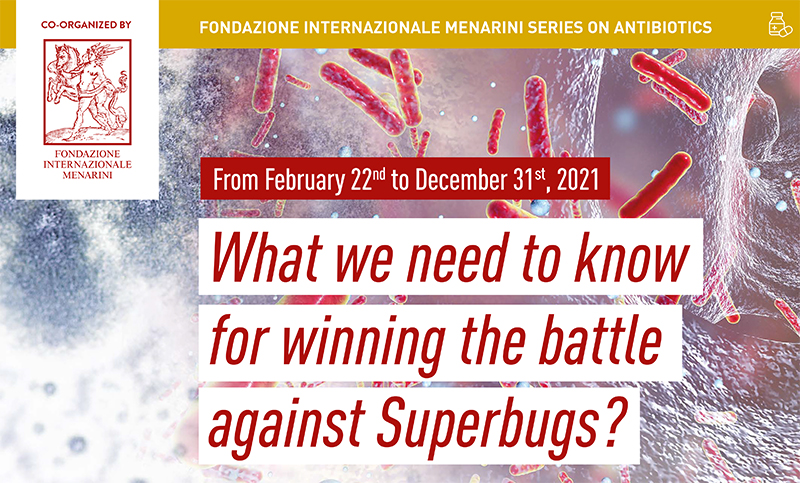
Antibiotic-resistant super-bacteria kill thousands of patients each year. The World Economic Forum has defined antibiotic resistance
as a global risk, which is not limited to health alone. The increase in life expectancy and advances in surgery, transplantology, oncology,
haematology and resuscitation have increased and made patients more vulnerable to infections contracted in hospital or during
healthcare, so it is estimated that without new drugs, by 2050 the phenomenon of antibiotic resistance could cause 450,000 deaths in
Italy alone.
New antibiotics would be able to reduce mortality by a third, from now on saving 3,000 lives each year. Antibiotic resistance is therefore a
hot topic and the purpose of this training course is to take stock of the situation and describe new strategies for fighting this phenomenon.
The spectre of a pre-antibiotic era, which would take us back a hundred years, is stretching inexorably over global public health due to
super-resistant bacteria. Already today, they kill 33,000 people in Europe every year, and 10,000 in Italy alone, the most affected nation
together with Greece, and almost 5% of hospitalised patients suffer from an infection that cannot be treated with common antibiotics.
The forecasts for the future are very serious and to be able to fight the battle against multi-resistant germs it is necessary to boost
research and encourage the use of new antibiotics, true lifesavers like the anticancer drugs, thus overcoming the paradox of “not
treating an infection today for fear that it will become more serious or less curable tomorrow”.
By 2050, it is expected that there will be 392,000 deaths in Europe, 10 million worldwide, and about 450,000 in Italy, surpassing the
mortality rate for cancer, with an economic impact of 100 trillion dollars. An emergency that could be overcome thanks, on the one
hand, to new antibiotics by intensifying scientific research and, on the other hand, by making the best use of the most innovative drugs.
It is therefore essential for the new antibiotics to be used earlier on, even in an appropriate empirical way, above all for the most critical
and serious patients in which a delay, even a few hours, in starting the right antibiotic therapy, could be fatal.
The fight against antibiotic resistance cannot be separated from the training of doctors: many do not know about the new drugs and
are afraid to use them. Only 35% use them, often with a delay, wasting precious time and exposing patients to a greater risk of serious
complications. A change of pace is indispensable because simple prevention is no longer sufficient: even by administering antibiotics
only when necessary and paying close attention to the containment of infections and bacterial transmission in hospitals and nursing
homes, only 50% of infections acquired during healthcare can be prevented.
Antibiotics are therefore still a lifesaver, especially for the numerous fragile patients such as the elderly, patients undergoing organ
transplants or cancer treatment, those in intensive care or who have undergone major surgery. It is essential to carry out research to
identify new therapies, enhancing the value of innovative antibiotics, which, when included in appropriate therapeutic schemes, will
allow for protecting the efforts and investments made in support of patient health with huge savings of resources, in both the short and
long term.
Prof. Matteo Bassetti
Infectious Diseases Clinic, University of Genoa,
Hospital Policlinico San Martino – IRCCS, Genoa, Italy